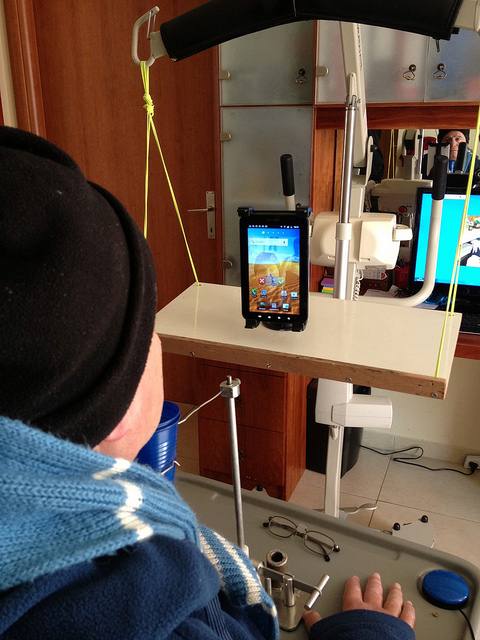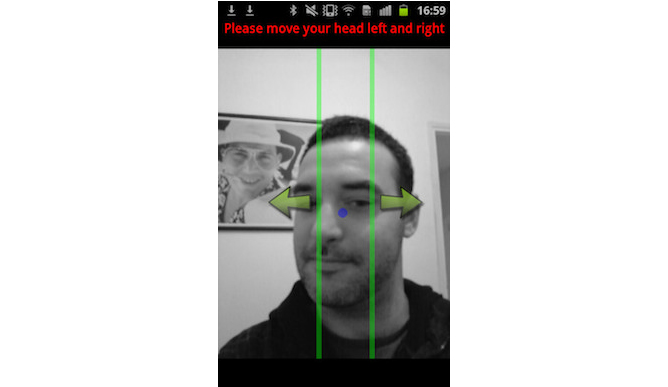Oded Ben Dov from the Israeli company Sesame Enable developed a way to use face movements to control video games. Four years ago, he did a demo on national Israeli TV, and caught the eye of Giora Livne, a quadriplegic family man now in his 50s.
Livne immediately placed an assisted call to Ben Dov, asking him if the same technology could help people with disabilities to use the phone. The duo ended up cofounding Sesame Enable to provide a hands-free way to communicate, do business and play.
“Open Sesame” comes to mind when one wants to open closed doors. Sesame Enable is meant to conjure something similar, but for people with disabilities.
“Giora told me that he can’t operate his hands or feet. Could I make him a phone he could use?” Ben Dov tells ISRAEL21c. “I jumped on the opportunity because it is a worthwhile cause and there is a do-good feeling there that is priceless.
“We set out to make a proof of concept, and when we saw it was working, we developed it further and today there is an SDK, a software development kit. This means that people can develop on it or with it.”
The company will also offer the application inside new phones, sold through cellular operators or phone manufacturers.
The platform turns a smartphone or iPad into a machine that recognizes face movements and hand gestures, without extra tools or add-ons. The application is being tested by Livne, who is using his extensive contacts to help bring the tool to the hands of so many who need it.
Not just Candy Crush
Sesame Enable is a new window of communication for people who are paralyzed or suffering from Parkinson’s, ALS or cerebral palsy. It enables them to read through an article by nodding slightly left or right, or navigate with a downward or upward look. The same principle works for dialing numbers on a keypad, or even turning the device on or off, says Ben Dov, who is 32.
Using a prototype, testers are happily playing Angry Birds and Candy Crush, phoning their friends and doing anything that once required digital dexterity. The final version of the application will be launched in a couple of months, Ben Dov hopes.
“You should see the face of just one of the people who uses it,” he tells ISRAEL21c. “I’ve met an eight year-old paralyzed from a car accident at a special-needs school. Of course I feel sorry for the boy, but I also feel joy when I see him using the phone with our technology. “For him, he’s just an eight-year-old playing a game. Now he can control gestures with his face.”
Ben Dov and Livne started working on the product intensely two years ago. Before that, he’d worked at the Israeli network security software company Check Point, having earned a degree at the Technion-Israel Institute of Technology in Haifa. In the army, Ben Dov coded at the elite Unit 8200, the equivalent to the NSA in America. “I could have gone back to Microsoft or Google, but wanted to go forward,” he says.
The Israeli gaming company Umoove is a rival in this space, but it focuses on gaming, like Ben Dov’s original application. Another Israeli company, Omek Interactive — recently acquired by Intel — makes hand gesture-tracking software meant to eliminate the need for keyboards among the general population.
Fast distribution
Ben Dov won’t say whether there will be an actual device for the application in the future to further enhance the experience. For now, he says, he hopes to develop the technology so it works with a simple webcam attached to a regular PC.
“All the tracking is built into the device, which allows us to drop prices and distribute it much faster,” he says.
With Livne, “Together we are working with the major rehabilitation bodies in Israel such as Yad Sarah, Beit Levenstein and Independent Living Centers. We’ve met them all and they are all interested in our work.”

Before becoming paralyzed as a result of injuries sustained in a fall, Livne was an electrical engineer who worked building power plants around the world.
He and Ben Dov are bootstrapping this venture and are looking to use some recently earned Office of the Chief Scientist funds from the Israeli government to launch their product.
Sesame Enable is based in Tel Aviv and employs five people.
The dream exit? That’s the golden question to ask every Israeli startup.
“Google, Apple, Microsoft or a phone manufacturer who could bring it to everyone who needs it,” Ben Dov answers with ease.
For more information, see www.sesame-enable.com.













